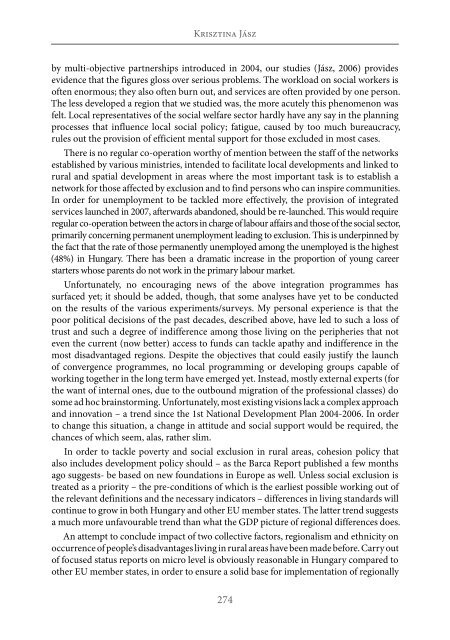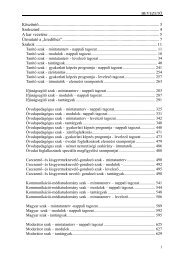ACTA SZEKSZARDIENSIUM - Pécsi Tudományegyetem Illyés Gyula ...
ACTA SZEKSZARDIENSIUM - Pécsi Tudományegyetem Illyés Gyula ...
ACTA SZEKSZARDIENSIUM - Pécsi Tudományegyetem Illyés Gyula ...
Create successful ePaper yourself
Turn your PDF publications into a flip-book with our unique Google optimized e-Paper software.
Krisztina Jász<br />
by multi-objective partnerships introduced in 2004, our studies (Jász, 2006) provides<br />
evidence that the figures gloss over serious problems. The workload on social workers is<br />
often enormous; they also often burn out, and services are often provided by one person.<br />
The less developed a region that we studied was, the more acutely this phenomenon was<br />
felt. Local representatives of the social welfare sector hardly have any say in the planning<br />
processes that influence local social policy; fatigue, caused by too much bureaucracy,<br />
rules out the provision of efficient mental support for those excluded in most cases.<br />
There is no regular co-operation worthy of mention between the staff of the networks<br />
established by various ministries, intended to facilitate local developments and linked to<br />
rural and spatial development in areas where the most important task is to establish a<br />
network for those affected by exclusion and to find persons who can inspire communities.<br />
In order for unemployment to be tackled more effectively, the provision of integrated<br />
services launched in 2007, afterwards abandoned, should be re-launched. This would require<br />
regular co-operation between the actors in charge of labour affairs and those of the social sector,<br />
primarily concerning permanent unemployment leading to exclusion. This is underpinned by<br />
the fact that the rate of those permanently unemployed among the unemployed is the highest<br />
(48%) in Hungary. There has been a dramatic increase in the proportion of young career<br />
starters whose parents do not work in the primary labour market.<br />
Unfortunately, no encouraging news of the above integration programmes has<br />
surfaced yet; it should be added, though, that some analyses have yet to be conducted<br />
on the results of the various experiments/surveys. My personal experience is that the<br />
poor political decisions of the past decades, described above, have led to such a loss of<br />
trust and such a degree of indifference among those living on the peripheries that not<br />
even the current (now better) access to funds can tackle apathy and indifference in the<br />
most disadvantaged regions. Despite the objectives that could easily justify the launch<br />
of convergence programmes, no local programming or developing groups capable of<br />
working together in the long term have emerged yet. Instead, mostly external experts (for<br />
the want of internal ones, due to the outbound migration of the professional classes) do<br />
some ad hoc brainstorming. Unfortunately, most existing visions lack a complex approach<br />
and innovation – a trend since the 1st National Development Plan 2004-2006. In order<br />
to change this situation, a change in attitude and social support would be required, the<br />
chances of which seem, alas, rather slim.<br />
In order to tackle poverty and social exclusion in rural areas, cohesion policy that<br />
also includes development policy should – as the Barca Report published a few months<br />
ago suggests- be based on new foundations in Europe as well. Unless social exclusion is<br />
treated as a priority – the pre-conditions of which is the earliest possible working out of<br />
the relevant definitions and the necessary indicators – differences in living standards will<br />
continue to grow in both Hungary and other EU member states. The latter trend suggests<br />
a much more unfavourable trend than what the GDP picture of regional differences does.<br />
An attempt to conclude impact of two collective factors, regionalism and ethnicity on<br />
occurrence of people’s disadvantages living in rural areas have been made before. Carry out<br />
of focused status reports on micro level is obviously reasonable in Hungary compared to<br />
other EU member states, in order to ensure a solid base for implementation of regionally<br />
274




